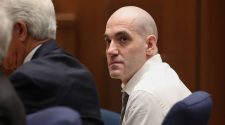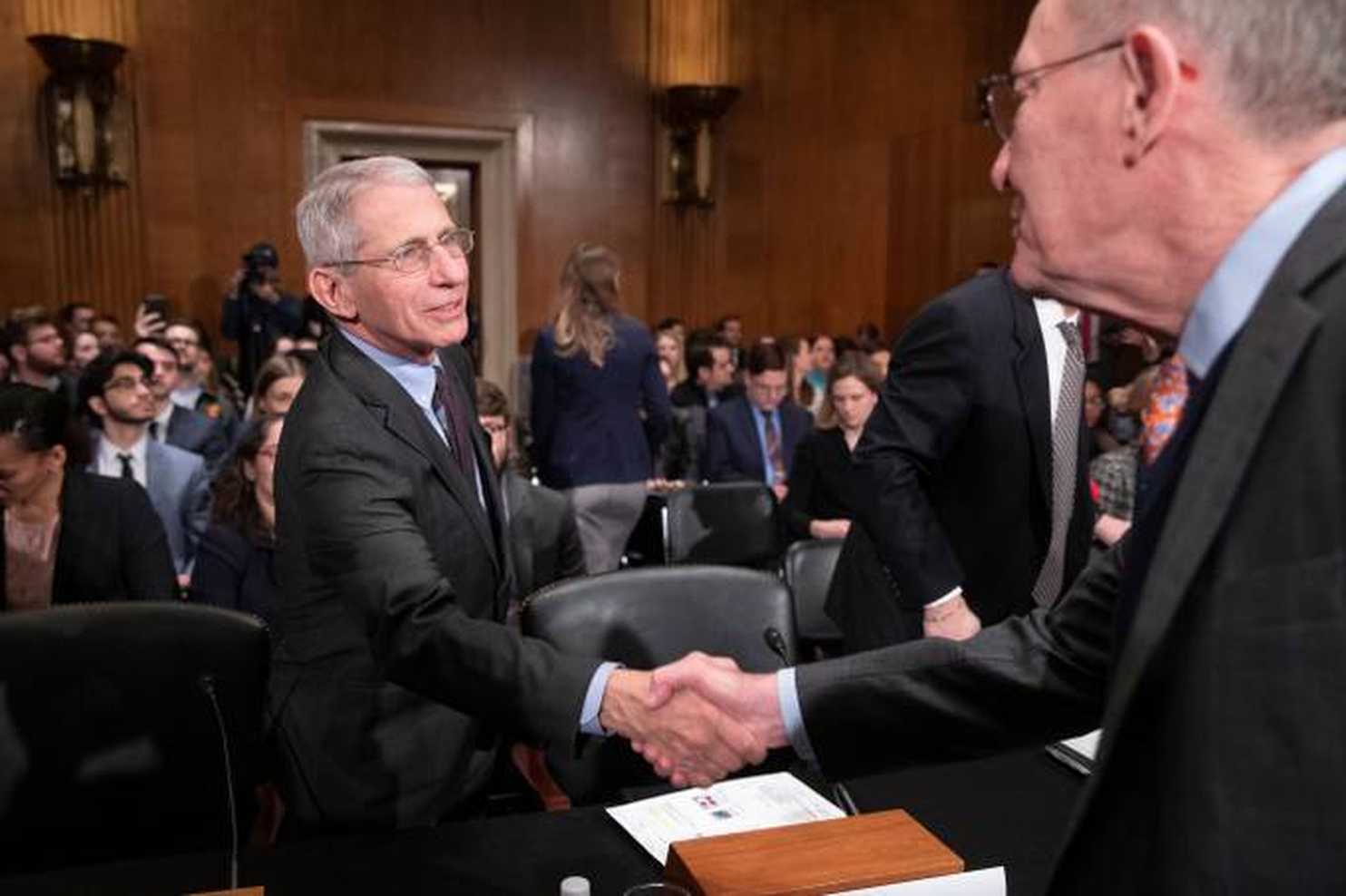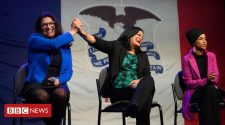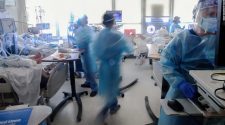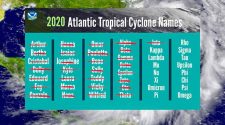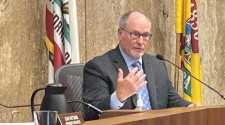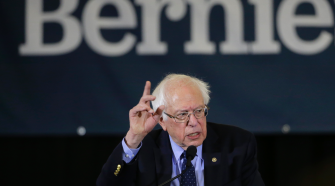THE PROGNOSIS
Anthony Fauci, director of the National Institute for Allergy and Infectious Diseases, shakes hands with Sen. Lamar Alexander (R-Tenn.). (Michael Reynolds/EPA-EFE/Shutterstock)
For months, Congress has stalled on legislation to protect Americans from “surprise” medical bills. Now there’s an unexpected chance to get it done, as lawmakers and the White House race to combat effects of the coronavirus with a massive stimulus package.
Leaders of the House and Senate health committees are pushing to include language on surprise billing within the $1 trillion measure being negotiated between Congress and the White House, aides and lobbyists told The Health 202.
Its cheerleaders are Sen. Lamar Alexander (R-Tenn.) and Rep. Frank Pallone (D-N.J.), who reached a bipartisan agreement in December on how to eliminate the burdensome bills Americans often get after visiting an out-of-network emergency room or receiving care from an out-of-network provider at an in-network hospital, through no fault of their own.
The whole effort kicked off an intense lobbying battle last year between insurers and medical providers over the details of how these bills would be settled. Yet there are reasons Congress could finally manage to tackle surprise medical billing in the new coronavirus legislation.
For one thing, ending surprise medical billing would allow lawmakers to tout another way they’ve made medical care more accessible to Americans, at a time when millions of people are finding their lives upended with businesses, schools, gyms and community centers shuttering.
And the Alexander/Pallone measure could help pay for extending dollars for community health centers, which play a crucial role in public health and face a funding cliff on May 22. The centers are pleading with lawmakers to extend their funding for five years within the stimulus bill — which, they note, will probably include money to boost non-health-care industries, such as the airlines.
“There could be bailout packages for Boeing and other industries,” Steve Carey, chief strategy officer for the National Association of Community Health Centers, told me. “We are not looking for a bailout. We are looking to make sure we are whole so we can take care of patients.”
Eliminating surprise billing was a top priority for Congress before the spread of covid-19. Earlier this year, House Speaker Nancy Pelosi (D-Calif.) was working to merge measures from three separate committees, with the goal of holding a floor vote this spring.

Senate Majority Leader Mitch McConnell leaves a Republican caucus meeting on Capitol Hill on Wednesday. Mandatory Credit: Photo by MICHAEL REYNOLDS/EPA-EFE/Shutterstock (10587519d)
All those plans, of course, were upended by the coronavirus — although the pandemic has upped the urgency to address the many ills plaguing the U.S. health-care system.
It’s far from certain Alexander and Pallone will be successful now, lobbyists say. Things are changing by the hour as the administration and congressional leaders negotiate the proposed $1 trillion rescue plan intended to help save the U.S. economy now hobbled by the massive nationwide shutdown of schools, businesses and recreational events.
The plan includes sending two large checks to many Americans and devoting $300 billion to helping small businesses avoid mass layoffs, The Post’s Erica Werner, Jeff Stein and Mike DeBonis report. Priorities laid out in a two-page Treasury Department document also include $50 billion to help rescue the airline industry and $150 billion to prop up other sectors, which could include hotels.
“The emerging government stimulus package could be unprecedented in its size and velocity, dwarfing the $800 billion stimulus law passed during the Obama administration and the $700 billion Troubled Asset Relief Program enacted during the Bush administration,” my colleagues write. “All told, between several legislative packages advanced on Capitol Hill and other actions the government has taken, the White House is pushing an economic plan that is ‘over $2 trillion and counting’ to try and arrest the coronavirus’s economic wrecking ball.”
Politico’s Ben White:
A person asked me if covering the 2008 crisis was this grim. No. It was awful. And scary. I left the NYT newsroom shaken on many nights.
But this is far worse. A terrifying, world altering health crisis with a financial crisis strapped to its back and poised to explode.
— Ben White (@morningmoneyben) March 19, 2020
Sen. Bernie Sanders (I-Vt.):
We are likely already in a recession.
Workers are losing income while their bills pile up.
We need to provide direct, emergency $2,000 cash payments to every person in America every month for the duration of the crisis.
— Bernie Sanders (@BernieSanders) March 18, 2020
Getting the Alexander/Pallone bill passed would be a boon to the White House, health insurers and patient groups, who have thrown their support behind its approach of pegging out-of-network bills to in-network rates.
But doctors and conservative groups have lined up against that approach, which they argue would hurt medical providers by driving rates too low.
“It is critical that at a time of a national emergency you focus on the needs of the country and not use the pandemic as an opportunity to enact government rate-setting that would harm our patients and our healthcare system,” the Taxpayers Protection Alliance and 23 other free market-oriented groups wrote in a letter to congressional leadership yesterday.
Dark-money groups funded by doctor staffing firms have spent tens of millions of dollars on opposition ads, and Capitol Hill aides acknowledge their influence could stymie Alexander and Pallone’s effort to pass their measure now.
“It’s a convenient foil for them to say, ‘Don’t do it during a disaster,’ ” Zach Roday, a Republican spokesman for the House Energy and Commerce Committee, told me. “At the end of the day they don’t want to see it done.”

Treasury Secretary Steven Mnuchin speaks to journalists after the weekly Senate Republican Caucus on Tuesday. (Photo by Melina Mara/The Washington Post)
— The support of most GOP lawmakers for the hastily crafted stimulus marks a sea change on the political right, my colleagues Robert Costa and Philip Rucker write.
“The president and many of his conservative allies rose to power on the strength of a grass-roots movement forged in opposition to the bank bailouts during the 2008 financial crisis and President Obama’s subsequent economic stimulus package….Scrutiny of Trump’s plan continues to grow as some Republicans express unease about its scope,” they write. “And there is some trepidation within the administration about the political risks associated with the perception that industries spend money as they wish — as well as uncertainty about how, exactly, all of the money would be spread around.”
Post reporter Seung Min Kim:
When Mnuchin visited with GOP senators at Tuesday lunch, he pleaded not to use the politically-charged word “bailout” in describing the proposed relief for Boeing. One senator raised a hand and asked if they should instead call them “freedom payments” https://t.co/Simg78F6U6
— Seung Min Kim (@seungminkim) March 18, 2020
— As Congress works on the newest stimulus package – which would be its third measure responding to the coronavirus – President Trump has signed into law a bill to ensure paid leave benefits to many Americans and other aid to fight the pandemic.
“The legislation also promises free coronavirus testing to anyone who needs it, including the uninsured; increases health funding around the country; and supports nutrition programs such as the food stamp system,” Hannah Knowles and Heather Long write on the Post’s coronavirus live blog.
“The measure will grant two weeks of paid sick leave at 100 percent of the person’s normal pay, up to $511 per day,” they add. “It also will provide up to 12 weeks of paid family and medical leave at 67 percent of the person’s normal pay, up to $200 per day.”
AHH, OOF and OUCH
AHH: The White House is finally giving federal agencies more specific guidance, instructing them to limit operations and focus on “mission-critical” services as the latest step to combat the spread of the coronavirus.
Acting budget director Russell Vought told department leaders to “postpone or significantly curtail” operations that can’t be done remotely or that require face-to-face interaction with the public, our Post colleagues Lisa Rein and Eric Yoder report.
“The memo was the strongest direction yet to federal leaders to put themselves on an emergency footing to fight the coronavirus,” they add. “But it did not order agencies to trigger what are known as ‘continuity of operations’ plans, the most extreme emergency planning tool at their disposal to scale back to essential services.”
— Trump said he will invoke the Defense Production Act, “a 1950 law that could allow the federal government to compel the private sector to accelerate the development of critical medical equipment,” Toluse Olorunnipa, Nick Miroff and Dan Lamothe report.
“Trump’s move signaled an effort to stand up a more robust federal operation to combat a virus that has quickly spread across the country, taking hold in all 50 states and threatening to crush the economy,” they report. “The flurry of announcements Wednesday marked the most concentrated campaign yet by the Trump administration to slow the advance of covid-19, the disease caused by the virus.”
Trump also likened himself to a “wartime president.” “I look at it, I view it as, in a sense, a wartime president. I mean, that’s what we’re fighting,” he told reporters.
I only signed the Defense Production Act to combat the Chinese Virus should we need to invoke it in a worst case scenario in the future. Hopefully there will be no need, but we are all in this TOGETHER!
— Donald J. Trump (@realDonaldTrump) March 18, 2020
Some context from The Post’s Aaron Blake:
The journey from Trump saying, “You have to be calm. It’ll go away” on March 6 to saying 12 days later that this is tantamount to a war is remarkable.
— Aaron Blake (@AaronBlake) March 18, 2020
— Trump added that the Federal Emergency Management Agency is now “engaged at its highest levels” and will take on a larger role in the nonmedical response to the crisis.
The agency is preparing to send 50 teams across the country to support states and local areas grappling with disruptions.
“The White House task force will continue to run the government response, but FEMA is best qualified to coordinate among federal agencies, deploy resources and respond to state requests for assistance, while allowing HHS and the CDC to continue to take the lead on the medical emergency response,” our colleague Nick Miroff writes, citing Dan Kaniewski, who stepped down in January as FEMA’s second-in-command.
Another administration move, via CNN’s Abby Phillip:
Wow: HHS issuing a regulation today allowing doctors to practice across state lines.
— Abby D. Phillip (@abbydphillip) March 18, 2020
— Still, Americans are worried about the response from the White House, even as they rate the reaction from state and local officials positively.
A new Pew Research Center survey conducted March 10-16 found a 52 percent majority of Americans say Trump has not taken the outbreaks risks seriously enough. “Clear majorities rated CDC officials as well as state or local officials positively for responding to the outbreak, though less than half said the same for President Trump,” our colleague Scott Clement writes.

Mice used for fetal tissue research are kept in the vivarium mice room at the Biomedical Sciences Research Building at the University of California at Los Angeles. (Philip Cheung for The Washington Post)
OOF: An immunologist says his efforts to conduct experiments on possible coronavirus treatments have been thwarted because of the Trump administration’s restrictions on fetal tissue research.
Kim Hasenkrug, an immunologist at the National Institutes of Health’s Rocky Mountain Laboratories in Montana, has been appealing to top NIH officials for weeks. He says the pandemic should be cause for an exemption to the decision to limit funding of research that uses fetal tissue, our Post colleague Amy Goldstein reports.
HHS spokeswoman Caitlin Oakley said “no decision has been made” about the request.
These experiments can be fruitful, some researchers tell The Post, pointing to two relevant discoveries made just months ago. Scientists “found that specialized mice could be transplanted with human fetal tissue that develops into lungs — the part of the body the new coronavirus invades. These ‘humanized mice,’ they also found, could then be infected with coronaviruses — to which ordinary mice are not susceptible — closely related to the one that causes the new disease, covid-19.”
“When I hear the vice president saying [they’re] doing everything they can to find vaccines [and treatments], I know that is not true,” said one scientist, referring to the administration’s daily coronavirus briefings. “Anything we do at this point could save hundreds of thousands of lives. If you wait, it’s too late.”
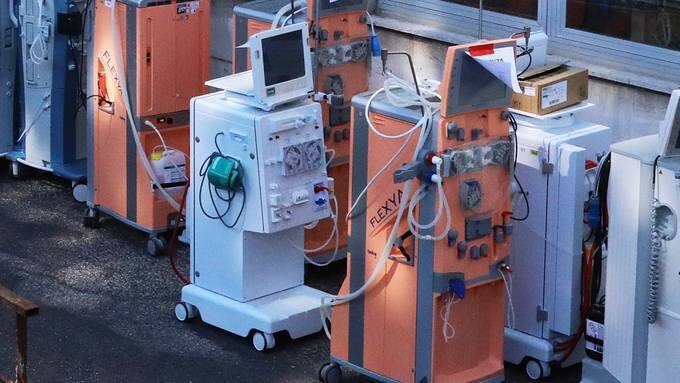
New ventilators outside the Columbus Covid 2 Hospital in Rome. U.S. health industry executives say the country is facing potential shortages of ventilators needed to treat the most serious cases of covid-19. (Marco Di Lauro/AFP/Getty Images)
OUCH: U.S. hospitals don’t have enough ventilators. But they also can’t afford to purchase them for what may be a relatively short-term increase in demand.
There are growing fears about the anticipated shortage of lifesaving equipment — as well as growing calls for the government to step in and help.
“The lack of ventilators — and growing calls for a more aggressive government role to fill the gap — was a subject of tense exchanges this week between President Trump and state officials,” our Post colleague Christopher Rowland reports. “The issue also revealed a disconnect between different parts of the health-care industry, with the main hospital association disputing the accounts about the adequacy of supply of the lifesaving equipment.”
The shortage will depend on the severity of the outbreak. “Depending on how bad the coronavirus pandemic gets in the United States, individual cities could come up thousands of ventilators short as patients flood hospitals, researchers say,” he adds.
— The Centers for Medicare and Medicaid Services is calling on surgeons, physicians and dentists to limit nonessential surgeries and procedures.
It’s one way protective equipment and critical supplies such as ventilators can be preserved for workers dealing with the onslaught of coronavirus patients, our colleague Lenny Bernstein writes.
“The reality is the stakes are high, and we need to preserve personal protective equipment for those on the front lines of this fight,” CMS Administrator Seema Verma said.
— There are also shortages nationwide of everyday supplies needed to ramp up testing of the spreading disease.
Crucial items — such as chemical solutions, cotton swabs and face masks for health-care workers — are in short supply, Carolyn Y. Johnson, Brady Dennis, Steven Mufson and Tom Hamburger report.
“The scarcity is hampering both the ability of health-care workers in hospitals to draw samples to send to laboratories and the ability of those laboratories to confirm infection,” they write. “This week, the Centers for Disease Control and Prevention attempted to address the mask shortage by recommending the use of bandannas, if necessary.”
“The bottom line is, if you cannot protect health-care workers and they get sick, the whole system goes down,” said Nicole Lurie, who served under President Barack Obama as assistant secretary for preparedness and response at HHS. “The priority to maintain public health is to protect health-care workers.”
Lurie said the bandanna suggestion should serve as a “wake-up call.”

Notes of support are posted on a sign outside the Senate office of Sen. Bernie Sanders (I-Vt.), who is seeking the Democratic presidential nomination. (Patrick Semansky/AP)
— Sen. Bernie Sanders (I-Vt.) signaled he is open to ending his presidential bid following a trio of decisive wins by former vice president Joe Biden this week.
“Sanders campaign officials said the senator from Vermont planned to leave Washington and return home, where he and his wife, Jane, would talk to supporters and determine the future of his presidential run,” our Post colleagues Sean Sullivan, Michelle Ye Hee Lee and Jenna Johnson report.
“… Biden deputy campaign manager Kate Bedingfield said that aides to the two candidates have been in touch regularly to discuss the public health crisis that has gripped the country, disclosing talks that could form the basis of a broader agreement on policies and might make Sanders more comfortable leaving the race.”
Sanders brushed off a question from CNN’s Manu Raju yesterday about the timing of any decision. “I’m dealing with a … global crisis, you know?” Sanders said, using an expletive. “We’re dealing with it. And you’re asking me these questions, right?”
— Meanwhile, Trump took aim at Biden — who appears on track to be the Democratic nominee — and insisted his administration is doing a good job in response to the outbreak. “We have very great approval numbers. People like the job we are doing,” he said, without citing a specific poll. He later added, again without specifics: “I’m beating Sleepy Joe Biden by a lot in Florida and a lot of other states.”
— States continue to make moves to try to delay voting amid the public health crisis.
The Democratic National Committee and the Wisconsin Democratic Party sued the Wisconsin Elections Commission to extend the deadline for registering to vote for state’s primary, currently scheduled for April 7, reports our colleague Isaac Stanley-Becker. “As Wisconsin citizens continue to distance themselves to ensure their safety, many will be unwilling to risk their safety and the safety of others by waiting in line to register to vote and cast their vote on election day,” the filing reads.
— Read this story from our colleague Chelsea Janes about the “adjustments Biden, Sanders and their campaigns are being forced to make as the coronavirus spreads. The two near-octagenarians are ditching habits honed over a combined 90 years in politics at a decisive moment in the 2020 Democratic primary.”

A medical worker treats a patient suffering from coronavirus disease in an intensive care unit at the Oglio Po hospital in Cremona, Italy. REUTERS/Flavio Lo Scalzo
— States and cities continue to take drastic measures to curb the spread:
— Other headlines and developments to catch up on this morning:
By the numbers:
- At least two members of Congress have tested positive for the coronavirus, forcing other lawmakers to self-quarantine.
- Almost 40 percent of the patients ill enough to be hospitalized were between ages 20 and 54, according to new data released by the CDC. The report on nearly 2,500 of the first recorded U.S. cases found “20 percent of the hospitalized patients and 12 percent of the intensive care patients were between the ages of 20 and 44, basically spanning the millennial generation,” the New York Times reports.
- China on Thursday reported zero domestic coronavirus infections in the country the previous day. It marked the first time since the outbreak began.
The hardest hit:
- Kids are carriers and grandparents are vulnerable. It’s left parents with difficult choices, The Post’s Caitlin Gibson writes.
- More than 6 million children in the United States live with a grandparent, and about 2.4 million live in such a household without a birth parent in the home, The Post’s Tara Bahrampour and Samantha Schmidt report. “If something happens to us,” said 68-year-old Cassandra Gentry, who raises two grandchildren, “what happens to our children?”
- California is preparing for a labor shortage that could hamper efforts to “maintain the nation’s fresh food supply amid the widening coronavirus outbreak,” the Los Angeles Times’s Geoffrey Mohan reports.
The response from agencies:
- The Food and Drug Administration is seeking out details on Twitter about shortages in testing supplies, Politico’s David Lim reports.
News you can use as you practice social distancing:
- How local restaurants say customers can support them as they face unprecedented restrictions and shutdowns to slow the spread.
- And in case you find yourself needing to learn how to cook ASAP, here are some helpful resources.





